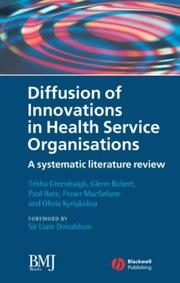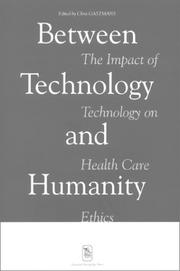| Listing 1 - 7 of 7 |
Sort by
|
Book
ISBN: 9782717838640 2717838643 Year: 1999 Publisher: Paris: Economica,
Abstract | Keywords | Export | Availability | Bookmark
 Loading...
Loading...Choose an application
- Reference Manager
- EndNote
- RefWorks (Direct export to RefWorks)
La notion de réseau s'est imposée progressivement au cours des dernières années en sciences sociales, dans le domaine de l'innovation comme dans bien d'autres, comme un outil incontournable pour analyser le mécanisme complexe d'interactions entre acteurs hétérogènes (par exemple entre des laboratoires de recherche, des firmes et des consommateurs). On fait ainsi appel au concept de réseau aussi bien pour décrire la mise en place des formes de coordination appropriées entre acteurs, que pour rendre compte de la dynamique de ces relations. Mais, la notion de réseau se heurte à un écueil majeur lié à son succès : sa polysémie, aussi bien entre disciplines qu'à l'intérieur même de chaque discipline, rend souvent son utilisation confuse. L'objectif du présent ouvrage est ainsi d'affirmer l'importance de la notion de réseau en sciences sociales, avec le parti pris suivant : ne pas renoncer à la richesse polysémique du concept, mais tenter de rendre compatibles ou comparables les cadres d'analyse et les outils élaborés par les différentes disciplines, particulièrement la sociologie et l'économie, pour comprendre et analyser les modes de coordination et la dynamique d'interactions entre agents -hétérogènes. Cet ouvrage résulte d'un échange prolongé au cours des dernières années, sous forme de séminaires ou de discussion de papiers de recherche portant sur la signification et l'utilisation de la notion de réseau, entre des chercheurs issus de disciplines différentes en sciences sociales : - Michel Callon, professeur en sociologie de l'innovation à l'Ecole Nationale Supérieure des Mines de Paris (CSI), - Patrick Cohendet, professeur de sciences économiques.à l'Université Louis Pasteur de Strasbourg (BETA), - François Eymard-Duvernay, professeur à l'Université de Paris X-Nanterre, - Dominique Foray, Directeur de recherche CNRS, IMRI-ISIS, Paris-Dauphine, - Nicolas Curien, professeur au CNAM, Paris, titulaire de la chaire " économie et politique des télécommunications ", auxquels se sont joints pour collaborer à cet ouvrage, Jean-Michel Dalle (Maître de conférences, ENS Cachan) et Eric Schenk (chercheur au BETA. Université Louis Pasteur de Strasbourg).
HM 711 Groups and organizations -- General works --- Social networks --- Social sciences --- Research, Industrial --- Technological innovations --- Research, Industrial. --- Sciences sociales --- Recherche industrielle --- Innovations --- Research. --- Economic aspects. --- Recherche --- Aspect économique --- Nets --- Innovation --- Economics

ISBN: 9780727918697 0727918699 Year: 2005 Publisher: Malden (Mass.) Blackwell
Abstract | Keywords | Export | Availability | Bookmark
 Loading...
Loading...Choose an application
- Reference Manager
- EndNote
- RefWorks (Direct export to RefWorks)
This is a systematic review on how innovations in health service practice and organisation can be disseminated and implemented. This is an academic text, originally commissioned by the Department of Health from University College London and University of Surrey, using a variety of research methods. The results of the review are discussed in detail in separate chapters covering particular innovations and the relevant contexts. The book is intended as a resource for health care researchers and academics.
W 84 Health services. Quality of health care (General) --- Delivery of Health Care --- Health Services Administration --- Diffusion of Innovation --- Diffusion of innovations --- Health services administration --- Medical care --- trends --- Quality control --- Research&delete& --- Methodology

ISBN: 9780071592086 0071592083 Year: 2009 Publisher: New York : McGraw-Hill,
Abstract | Keywords | Export | Availability | Bookmark
 Loading...
Loading...Choose an application
- Reference Manager
- EndNote
- RefWorks (Direct export to RefWorks)
Health Care Reform --- Health Services Administration --- Organizational Innovation --- Diffusion of Innovation --- Models, Organizational --- WX 150 Hospital Administration. General works --- Health services administration. --- Public health administration. --- Disruptive technologies. --- Sociology of social care --- Hygiene. Public health. Protection --- Disruptive technologies --- Health services administration --- Public health administration --- Health administration --- Health care administration --- Health sciences administration --- Medical care --- Public health --- Health care management --- Health services management --- Health planning --- Disruptive innovations --- Technological innovations --- Administration --- Management --- Services de santé publics --- Services nationaux de santé --- Technologie de rupture --- Public Health Administration --- Services de santé publics --- Services nationaux de santé

ISBN: 9780521854962 0521854962 9780511610769 9780521708883 0511610769 0511137575 9780511137570 0511135408 9780511135408 0511133995 9780511133992 0511167768 9780511167768 0511134436 9780511134432 9786610437115 6610437114 0521708885 1280437111 9781280437113 0511311907 9780511311901 1107155185 9781107155183 Year: 2005 Publisher: Cambridge ; New York, NY : Cambridge University Press,
Abstract | Keywords | Export | Availability | Bookmark
 Loading...
Loading...Choose an application
- Reference Manager
- EndNote
- RefWorks (Direct export to RefWorks)
Despite the pharmaceutical industry's notable contributions to human progress, including the development of miracle drugs for treating cancer, AIDS, and heart disease, there is a growing tension between the industry and the public. Government officials and social critics have questioned whether the multibillion-dollar industry is fulfilling its social responsibilities. This doubt has been fueled by the national debate over drug pricing and affordable healthcare, and internationally by the battles against epidemic diseases, such as AIDS, in the developing world. Debates are raging over how the industry can and should be expected to act. The contributions in this book by leading figures in industry, government, NGOs, the medical community, and academia discuss and propose solutions to the ethical dilemmas of drug industry behavior. They examine such aspects as the role of intellectual property rights and patent protection, the moral and economic requisites of research and clinical trials, drug pricing, and marketing.
Drugs --- Medical innovations --- Pharmaceutical industry. --- Social responsibility of business. --- Marketing --- Moral and ethical aspects. --- Research --- Social aspects. --- HD 9665.5 Pharmaceutical Industry --- pharmacie --- prijsvorming --- Ethics, Medical --- Pharmaceutical Preparations --- Drug Industry --- Varia organisaties en instellingen (GV) : Farmaceutische firma's --- Diverses organisations et institutions (SS) : Firmes pharmaceutiques --- Business --- Corporate accountability --- Corporate responsibility --- Corporate social responsibility --- Corporations --- CSR (Corporate social responsibility) --- Industries --- Social responsibility, Corporate --- Social responsibility of industry --- Business ethics --- Issues management --- Society and medical innovations --- Medicaments --- Medications --- Medicine (Drugs) --- Medicines (Drugs) --- Pharmaceuticals --- Prescription drugs --- Bioactive compounds --- Medical supplies --- Pharmacopoeias --- Chemotherapy --- Materia medica --- Pharmacology --- Pharmacy --- Drug industry --- Drug trade --- Medicine industry --- Medicines industry --- Prescription medicine industry --- Chemical industry --- Social responsibility --- Social aspects --- Business, Economy and Management --- Business Management --- Droit médical
Book
ISBN: 9789403003245 9403003243 Year: 2018 Publisher: Waterloo: Kluwer,
Abstract | Keywords | Export | Availability | Bookmark
 Loading...
Loading...Choose an application
- Reference Manager
- EndNote
- RefWorks (Direct export to RefWorks)
Cet ouvrage pratique présente un aperçu synthétique des exigences du RGPD, appliquées à la gestion du personnel. L’ouvrage aborde entre autres les questions suivantes : Quand peut-on traiter des données à caractère personnel de travailleurs et de candidats ?Quelle information communiquer aux travailleurs et candidats ?Comment un employeur peut-il démontrer son respect du RGPD ?Est-il obligatoire de désigner un délégué à la protection des données (privacy officer) ?Les contrats avec les fournisseurs de services liés à la gestion du personnel doivent-ils comporter des clauses particulières ?Que faire en cas de fuite de données ?L’employeur a-t-il des obligations particulières si les données de son personnel sont transmises à l’étranger ?A l’usage des responsables des ressources humaines et du recrutement avocats juristes d’entreprise.
gegevensbescherming --- personeelsbeleid --- vie privée --- protection des données --- gestion du personnel --- privéleven --- Data protection --- Protection de l'information (Informatique) --- Privacy, Right of --- Droit à la vie privée --- Personnel management --- Employees --- Law and legislation --- Droit --- Direction --- Personnel --- Employeur et employé (droit) --- Protection de l'information (informatique) --- Internet en milieu de travail --- Surveillance électronique en milieu de travail --- Travail et vie personnelle --- Informatique et travail --- Relations industrielles --- Droit européen --- Effets des innovations technologiques --- Relations professionnelles --- Belgium --- Legislation --- legislation and jurisprudence --- K 3150 Public law --- Algemene juridische begrippen : Privacy --- Notions juridiques générales : Vie privée --- Droit européen.
Book
ISSN: 17708362 ISBN: 9782212548426 2212548427 Year: 2011 Publisher: Paris: Eyrolles,
Abstract | Keywords | Export | Availability | Bookmark
 Loading...
Loading...Choose an application
- Reference Manager
- EndNote
- RefWorks (Direct export to RefWorks)
Quatrième de couverture : "Internet, e-mails, réseaux sociaux : aujourd'hui, les nouvelles technologies occupent de plus en plus de place dans notre vie. Un véritable tsunami d'informations nous assaille chaque jour. Comment ne pas se laisser submerger par ce flot de données ? Des outils et des méthodes efficaces existent pour que l'informatique nous facilite la vie. Le PKM, Persona ! Knowledge Management, en français la gestion des données personnelles, nous aide à contrôler, organiser et stocker nos données, aussi bien au niveau professionnel que privé. Ce concept est ici décliné sous la forme du modèle TIICC (Temps, Identité numérique, Information, Capital social, Compétences personnelles) pour apprendre à : gérer sa messagerie électronique, maintenir son agenda à jour, classer ses fichiers numériques, mettre au point une veille de l'information sur Internet, contrôler son image sur les réseaux sociaux, mettre en valeur ses compétences..."
HD 30.2 Electronic Data Processing. Information Technology. Artificial Intelligence. Knowledge Management --- Knowledge management --- Organisation and Administration --- connaissance - organisation (structure) --- données - gestion --- Informationswissenschaft --- Information resources management --- Instant messaging --- Electronic villages (Computer networks) --- Communication --- Gestion de l'information --- Messagerie instantanée --- Communautés virtuelles --- Technologies de l'information et de la communication --- données personnelles --- informatique. --- Information(Allgemein) --- Arbeitsorganisation. --- Technological innovations --- Organisation du travail --- work organization --- système d'organisation des connaissances --- système de relations --- relationship scheme --- carte conceptuelle --- concept map --- Information (gestion) Informatie (management) --- Gestion des connaissances Kennisbeheer --- Technologie de l'information Informatietechnologie --- données - gestion --- Messagerie instantanée --- Communautés virtuelles --- données personnelles --- Information resources management. --- Internet --- Knowledge Management --- utilization --- Middelen : Communicatiemiddelen (niet-publicatie, niet-evenement) --- Management (niet-HRM) : Knowledge management --- Moyens : Moyens de communication (non publication, non événement) --- Management (non GRH) : Gestion des connaissances --- Internet - utilization

ISBN: 9058672514 9789058672513 Year: 2002 Publisher: Leuven: Leuven university press,
Abstract | Keywords | Export | Availability | Bookmark
 Loading...
Loading...Choose an application
- Reference Manager
- EndNote
- RefWorks (Direct export to RefWorks)
In the last decade health care has witnessed a host of technological novelties in the field of diagnostic and therapeutic practices, as well as in the supportive information and communication technology and in various applications of genetics, microbiology and informatics. As a result a few questions need to be answered: -Is health care ethics due dor a splitting up into an ethics of technology (focusing on the ethical implications of new technologies) and an ethics of care (focusing on the ethical problems concerning chronic diseases, decay, disability, end of life)? -How to cope with dependence, limitation, finiteness, suffering, ... in spite of technological progress? -Could a better integration of technology and care preclude situations where patients are being dehumanised? Starting with a philosophical ethical reflection about the possibilities and dangers of technologies in health care, this book highlights both the relation between technology and care, and the normative aspects of economic analyses in health care. Finally, a series of concrete examples from various clinical fields (prenatal diagnosis, genetic tests, digital imaging in psychiatry, tube feeding in care for the elderly, and palliative sedation) will help the authors to consider how to integrate these technologies in a care context aimed upon humaneness. Since each topic is analysed by leading European clinicians and health care ethicists, this book clearly stands for the interdisciplinary approach in health care ethics. This book may be a rich source of material for reflection on the role, meaning and ends of technology and care, as harmonious aspects of clinical health care practice. However, the authors main concern is to show what such a reflection may consist of and how it can contribute to the inquiry into the experience of technology, the needs of humanity and the development of appropriate health care. This book highlights both the relation between technology and care, and the normative aspects of economic analyses in health care. A series of concrete examples from various clinical fields (prenatal diagnosis, genetic tests, digital imaging in psychiatry, tube feeding in care for the elderly, and palliative sedation) helps the authors to consider how to integrate these technologies in a care context aimed upon humaneness. Each topic is analysed by leading European clinicians and health care ethicists.
Environmental protection. Environmental technology --- Hygiene. Public health. Protection --- Professional ethics. Deontology --- Ethique médicale --- Medische ethiek --- Medische technologie --- Technologie médicale --- Medical care --- Medical ethics --- Soins médicaux --- Technological innovations --- Congresses --- Innovations --- Congrès --- Medical technology --- Medical ethics. --- Nursing ethics. --- Genetic screening. --- Biomedical Technology --- Bioethical Issues --- Nursing ethics --- Genetic screening --- Moral and ethical aspects. --- bejaarden (ouderen) --- 670 Gezondheid --- Biomedical Technology. --- Health Care Rationing. --- Bioethics. --- Ethics, Medical. --- Bioethical Issues. --- 241.63*2 --- 61 --- 174.2 --- -Nursing ethics --- bio-ethiek --- gezondheidszorg --- #GGSB: Bio-ethiek --- #GBIB:CBMER --- #gsdb5 --- Caritas Catholica Vlaanderen (1982-heden) --- gezondheidszorg [verplegend] --- technologie --- abortus --- psychiatrie --- euthanasie --- christelijke ethiek --- C5 --- sociaal beleid --- 17.023.33 --- #A0301A --- 061 Ethische problemen --- biomedische technologie --- ethiek van de technologie (technologiekritiek, technologiemisbruik) --- zorgethiek (ethiek van de zorg, zorgrelatie) --- prenatale diagnostiek (prenatale test) --- genetische screening --- ouderenzorg --- palliatieve zorgen, (terminale, continue) sedatie, pijnbestrijding met levensverkortend effect, stervensbegeleiding --- Medische uitrusting --- Geneeskundige beeldvorming --- Genetica --- Psychiatrie --- Palliatieve zorgen --- Academic collection --- 603.1 --- aangeboren afwijkingen (congenitale afwijkingen, hartafwijkingen) --- abortus provocatus (vruchtafdrijving, zwangerschapsafbreking) --- dementie (dementia, dementia senilis) --- eetstoornissen --- ethiek (moraal) --- genetica --- genetisch advies --- gezondheidseconomie --- medische technologie --- palliatieve zorgen --- parenterale voeding (TPN) --- prenatale diagnose --- psychodiagnostiek --- stervensbegeleiding --- Nurses --- Nursing --- Professional ethics --- Biomedical ethics --- Clinical ethics --- Ethics, Medical --- Health care ethics --- Medicine --- Bioethics --- Social medicine --- Human chromosome abnormalities --- Medical screening --- Bioethical Issue --- Issue, Bioethical --- Issues, Bioethical --- Euthanasia --- Human Experimentation --- Patient Rights --- Animal Experimentation --- Medical Ethics --- Professionalism --- Biomedical Ethics --- Health Care Ethics --- Ethics, Biomedical --- Ethics, Health Care --- Ethicists --- Healthcare Rationing --- Rationing, Health Care --- Rationing, Healthcare --- Health Resources --- Patient Selection --- Biomedical Technologies --- Technology, Biomedical --- Technology, Health --- Technology, Health Care --- Health Care Technology --- Health Technology --- Biomedical Engineering --- Medical Informatics --- Health care technology --- Health technology --- Technology --- Theologische ethiek: medische ethiek: dokter; verpleegster; ziekenhuis --- Geneeskunde. Hygiëne. Farmacie --- Beroepsmoraal van de artsen. Medische beroepsethiek --- Moral and ethical aspects --- soins de santé --- Maatschappelijke organisaties en maatschappelijk leven --- technologie biomédicale --- éthique de la technologie (critique de la technologie, abus de la technologie) --- éthique des soins --- diagnostic prénatal (test prénatal, DPN) --- dépistage génétique --- soins des personnes âgées --- soins palliatifs, lutte contre la douleur ayant pour effet d'abréger la vie, sédation palliative (terminale, continue), accompagnement de fin de vie --- Equipement médical --- Imagerie médicale --- Génétique --- Soins palliatifs --- (zie ook: orthopedie, seksuele ontwikkelingsstoornissen, vaatziekten) --- (zie ook: genetisch advies) --- (zie ook: dood, euthanasie, palliatieve zorgen, rouw, terminale zorgen) --- Diagnosis --- ethics --- 174.2 Beroepsmoraal van de artsen. Medische beroepsethiek --- 241.63*2 Theologische ethiek: medische ethiek: dokter; verpleegster; ziekenhuis --- Soins médicaux --- Ethique médicale --- Congrès --- Health Care Rationing --- medische ethiek --- Bio-ethiek --- WB 60 Bioethics. Clinical ethics. Clinical ethics committees --- Medical Laboratory Science --- Ethics, Nursing --- Genetic Screening
| Listing 1 - 7 of 7 |
Sort by
|

 Search
Search Feedback
Feedback About UniCat
About UniCat  Help
Help News
News